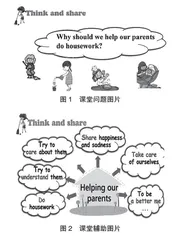基于立德树人理念的小学英语阅读教学实践与思考
作者: 陈炜

【摘要】当前英语课程改革的重点是在英语课堂教学中落实立德树人的根本任务,实现立德树人的目标。文章从解读教材语篇中的德育元素,发挥其立德树人的价值;有效应用信息技术资源,渗透立德树人理念;利用德育绘本资源,丰富立德树人内涵;全过程渗透德育四个方面,阐述在小学英语阅读教学中落实立德树人根本任务的实践与思考。
【关键词】小学英语;阅读教学;立德树人
作者简介:陈炜(1988—),女,江苏省南通市通州区通州小学。
小学英语阅读教学不仅可以向学生传授语言知识,提高学生的语言技能,还可以引导学生形成正确的价值观,培养他们的道德素质,从而实现立德树人的目标。本文将探讨如何在小学英语阅读教学中落实立德树人的根本任务,努力实现英语学科的育人目标。
一、解读教材语篇中的德育元素,发挥立德树人价值
英语阅读教学中涉及的语篇、主题和文化知识等蕴含着丰富的育人素材,为实现课程育人提供了有利条件。教师需要根据学生的需求,全方位解读教材,寻找教材与立德树人的关联点,充分发挥教材的育人价值,从而培养学生良好的思想道德品质,帮助学生树立正确的世界观、人生观和价值观,实现英语阅读教学和立德树人目标的有机统一[1]。
以译林版英语四年级上册Unit 5“Our new home”的教学为例。“Story time”呈现了Su Hai和Su Yang一家搬家的情境。笔者融合绘本Home is Best,启发学生思考家对于每个人的重要意义,帮助学生聚焦主题“Love your home, love your family”。以下为课堂教学片段。
T:Dear children, we all have a home. Mr Parrot has a home too. Does he like his home? Read the story quickly and find the answer.
S1:No. Mr Parrot doesn't like his home.
T:What do you want to say to Mr Parrot?
S2:Our home is the best.
T:Yes. Home is the best. We love our home. We share happiness and sadness with our family. It's the best place all over the world. Do you think so?
笔者围绕教材话题“家”对教学内容进行合理拓展,努力挖掘教材的育人价值,帮助学生建构对于家的深层理解,从而发挥英语课程的育人价值。
又以译林版英语四年级下册Unit 8“How are you?”
的教学为例。教材围绕Yang Ling生病后不能上学,给Miss Li打电话请假为情境展开。笔者在课堂中引导学生紧扣“care”一词,聚焦文本细节,分析背后的意义与价值。以下为课堂教学片段。
T:Look at Yang Ling. What's the matter with her?
S1:She's ill.
S2:She's staying in bed now.
T:What's she doing?
S3:She's making a telephone call to Miss Li.
T:Why?
S4:Maybe she can't go to school.
T:If you were Miss Li. What would you say to Yang Ling?
S5:I'm sorry to hear that. Take care, Yang Ling.
T:Wow, you are so sweet. You care about her. Does Miss Li care about Yang Ling?
Ss:Yes.
T:How does Miss Li care about her? Please read and find. What do you think of Miss Li?
S6:She is nice.
T:Miss Li really cares about her student, right? Try to care about each other in your daily life because we are happiest when we show care.
笔者联系学生的日常生活,深化学生对“care”一词的认识,引导学生主动关爱身边的朋友和亲人,切实发挥英语课程的育人作用。
二、有效应用信息技术,渗透立德树人理念
教师可以基于教材内容,应用文字、声音、视频等不同形式的信息资源,为学生打造真实、多元的语言学习环境,丰富学生的感官体验,更好地渗透立德树人理念,培养学生的道德品质。
以译林版英语六年级上册Unit 7“Protect the Earth”
的教学为例。笔者在导入环节应用多媒体设备播放自创的优美小诗,并配上一幅画。
T:The trees are where birds live. The rivers are where fish live. The sky is where clouds live. The soil is where seeds live. Where do we live?
S1:The school.
S2:Our class.
S3:The earth.
T:What do you know about the earth?
S4:Our earth is big and beautiful.
S5:There are many plants on the earth.
T:But nowadays our earth is facing big challenges.Please have a look.
T:What should we do?
S6:We must stop that.
S7:We should protect the earth.
在多媒体的辅助下,笔者有效地激发了学生保护地球、保护环境的欲望,实现育人目标。
三、利用德育绘本资源,挖掘德育主题
绘本是教师常用的阅读教学资源。教师可以利用体现德育主题的绘本实施阅读教学。
以绘本Octopus Is a Friend为例。此绘本讲述一只巨大且有些丑陋的章鱼想和斑点鱼成为朋友,却被斑点鱼无情拒绝;而在斑点鱼遇到危险时,勇敢的章鱼挺身而出,成功救下斑点鱼,并与之成为好朋友的故事。绘本的主题思想是“人不可貌相,要与人为善”。笔者通过问题,引导学生学习。
T:If you see someone in danger, what would you do?
S1:I will ask someone to help.
S2:I will call 110.
S3:I will try my best to help him.
T:You are wonderful.I am proud of you. But boys and girls, don't forget sometimes there is a limit to human. Look before you leap.
在阅读到章鱼奋不顾身救斑点鱼时,笔者引导学生思考。
T:If you were the octopus, would you help the spotty fish? Why?
S1:I will help the spotty fish because I want to save him.
S2:I will not help him because he was rude to me at first.
S3:I will try to help because he is so poor.
T:You can keep your idea. As we all know the octopus helps the spotty fish. What do you think of the octopus?
S4:He is friendly and helpful.
S5:He is kind.
S6:He is smart because he saves the spotty fish's life.
在绘本阅读教学的尾声,笔者请学生给绘本起标题并巧妙引出“不要以貌取人”的主题思想。教学片段如下。
T:Look at the cover of the book. The title is missing. Try to name it.
S1:A helpful octopus.
S2:A friendly octopus.
T:Well done. When we read a book, we should read the cover. But never judge a book by its cover.
笔者努力为学生搭建思维支架,设计融合学习理解、应用实践和迁移创新的阅读活动,鼓励学生针对不同的观点进行交流和辨析,帮助学生树立正确的人生观、价值观和世界观。
四、全过程渗透德育,深化立德树人目标
教师要将抽象的立德树人理念与学生的生活有机结合,引导学生在真实的生活情境中解决问题,培养学生正确的人生观、价值观和世界观。
以译林版英语五年级下册Unit 5“Helping our parents”的教学为例。此单元涉及“家庭与家务劳动”和“劳动与人们的生活”等内容。“Story time”部分以“家务劳动”为主题,围绕Mike和Helen周末在家帮助父母干家务活展开,要求学生会读、会说家务类短语clean the car、sweep the floor、wash the dishes、clean the table。
(一)课堂伊始,以问促思
笔者搜集并分享学生在家开展家务劳动的照片,揭示本课主题“Helping our parents”,以下为教学片段。
T:Do you help your parents do housework? What housework do you usually do?
S1:I help my parents clean the house and sweep the floor.
T:Why?
S1:Because my parents are tired after working for a day.